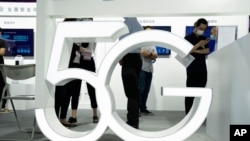The fifth-generation technology standard for broadband cellular network, or 5G, which began deploying across the globe last year, has a far greater bandwidth than its predecessor 4G. This means 5G can serve cellphones and the Internet’s last miles, providing possible new applications in internet of things and machine to machine communication.
However, the increased flow of data enabled by 5G’s greater bandwidth also means a greater exposure to attacks. “While technologies like 5G are creating tremendous growth opportunities, they also increase the risk posed by untrusted countries and companies, especially those beholden to authoritarian governments like the Chinese Communist Party,” said Under Secretary of State for Economic Growth, Energy, and the Environment Keith Krach at the Indo-Pacific Business Forum.
The question is, said Under Secretary Krach, who can we trust with our precious personal information, our customers’ most sensitive data, and our most valuable intellectual property? “It’s certainly not a company like Huawei, which is the backbone of the Chinese Communist Party’s surveillance state. And certainly not a country with a National Intelligence Act that says any Chinese company, state-owned or otherwise, or any Chinese citizen is required to hand over any information, proprietary technology, intellectual property, or data upon request to the Chinese Communist Party.”
That is why in August, Secretary Pompeo launched the Clean Network, the State Department’s effort to secure privacy, intellectual property, and national security from aggressive intrusions by malign actors, such as the Chinese Communist Party.
“The Clean Network is a comprehensive approach to addressing the long-term threats to data privacy, security, human rights, and trusted collaboration,” said Under Secretary Krach. “It’s rooted in internationally accepted digital trust standards, and it represents the execution of a multi-year, enduring strategy built on a growing coalition of over 49 Clean Countries, 170 Clean Telcos, and leading companies around the world.”
“All of us - governments, business, civil society, and I think especially the press - can continue to turn that tide against authoritarianism in the favor of freedom and security. There’s no sustainable prosperity without liberty.”






